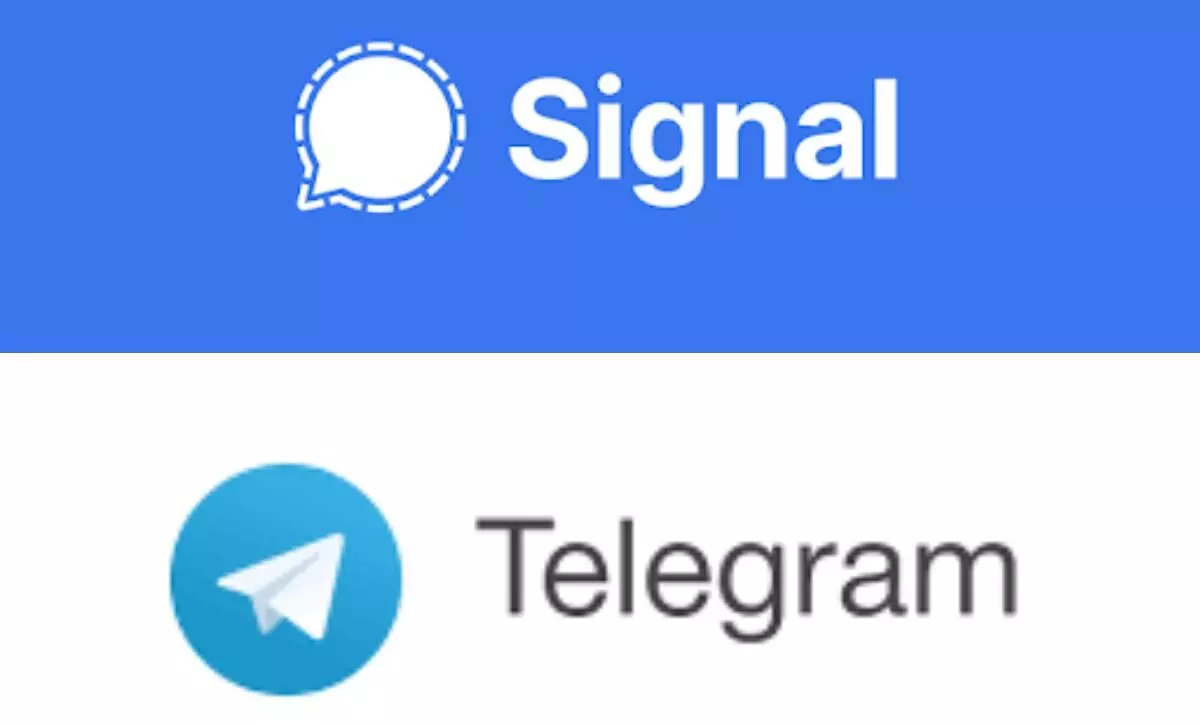Whatsapp new policy: Why are users shifting to Signal, Telegram
Recently, WhatsApp issued mandatory data-sharing rules asking its users to agree to a change in privacy policy before 8 February 2021 or stop using the app.
By Ranjith Raj Vasam
Hyderabad: Recently, WhatsApp issued mandatory data-sharing rules asking its users to agree to a change in privacy policy before 8 February 2021 or stop using the app.
"We may use the information we receive from them, and they may use the information we share with them, to help operate, provide, improve, understand, customize, support, and market our services and their offerings, including the Facebook Company Products," WhatsApp said.
It's not the first time WhatsApp has alarmed users about their privacy. WhatsApp in spite of being a popular IM app, had been a security nightmare with no E2E (end-to-end) encryption for a long time. Even now, there is no E2E for metadata and any third-party backend (Ex. Google drive, iCloud). Just until a few months ago (July 2020), WhatsApp had maintained that it would never share any kind of data with Facebook whatsoever. This recent policy is not only disingenuous but harmful for users' privacy.
Understanding Facebook's Business Plans
Facebook is moving in the direction to make "Social Commerce" its main source of revenue. It already started rolling out features like shopping, payments, and customer service to all its platforms.
For all the data-driven big business plans of Facebook, it needs big data of (users turned) customers, so it is turning all its apps into super-surveillance trackers. With the addition of WhatsApp data, Facebook finally has access to our individual, group, and business chats along with all the associated metadata.
This is the reason why we are seeing marked disapproval of a huge number of people along with an interest in moving to privacy-aware, non-surveillance platforms like Signal.
Image comparing Signal, iMessage, WhatsApp, and Messenger. https://specials-images.forbesimg.com/imageserve/5ff07f779f9392c3af404599/960x0.png
When Facebook realized that youths are ditching the platform, it acquired Instagram. When it realised Facebook is no more a popular app for communications it acquired WhatsApp. History has proven that both WhatsApp acquisition and Instragram acquisition are forceful acquisitions.
Surveillance Capitalism: A threat to democracy
Facebook has long promoted itself as a tool for bringing people together to make the world a better place and it had been proved time and again that the social media giant has been doing the opposite.
WhatsApp became a hub for fake news and misinformation campaigns. Some even incited violence leading to the deaths of people in countries like India and Sri Lanka. Misinformation campaigns have been disturbing the fabric of democracy.
Facebook's misinformation campaigns, advanced with micro-targeting influenced election choices that lead to the manipulation of elections in multiple countries.
During the 2016 US presidential elections, Cambridge Analytica got more than 87 million people's personal data from Facebook without the consent of users, from which they have pushed micro-targeted advertisements based on the interests of the users.
Recent US Capitol siege has its roots in Facebook algorithms that suggest users join extremist and reactionary groups. Some of these groups were used for organizing and coordinating the attack.
Users switching to privacy-aware alternatives
With the growing privacy awareness among people, we are witnessing popular trends like #WhatsAppExodus & #DeleteWhatsApp. People are exploring privacy alternatives, resulting in a huge spike in people switching to Signal.
Signal is a free software where its source code is publicly available. It is offered by a non-profit organisation named Signal Technology Foundation whose mission is to develop "Free and open source privacy technology that protects free expression and enable secure global communication".
Telegram, meanwhile, is a proprietary closed-sourced software (only clients are free and open source) with attractive features, especially for large communities. It is offered by a UK-registered private company that operates from the United Arab Emirates. Telegram is failing to counter cryptocurrency pump-and-dump activities by spambots on its platform, which has been a major disadvantage in the recent past for groups.
We need to realize that "privacy can't be assured without the source code being public", i.e. we can't verify the claims of any app about its privacy offerings unless all the source code is publicly available for scrutiny.
Free Software Movement of India recommends the free software Signal app over WhatsApp.
We urge people to join our community social network: https://fsmi.social - a distributed, secure, and privacy-aware social network that is a better alternative to Facebook and Twitter.